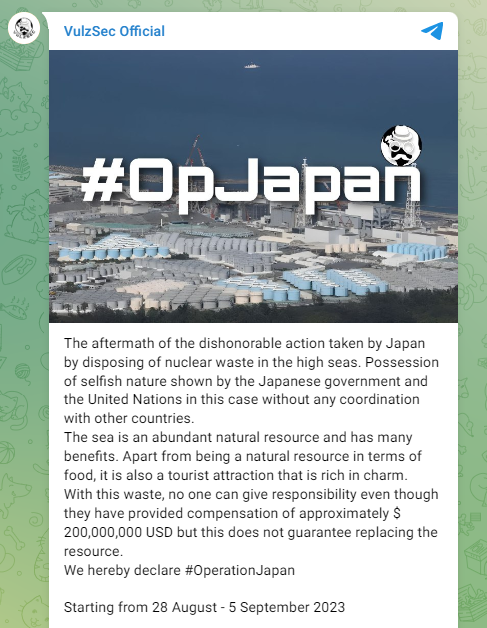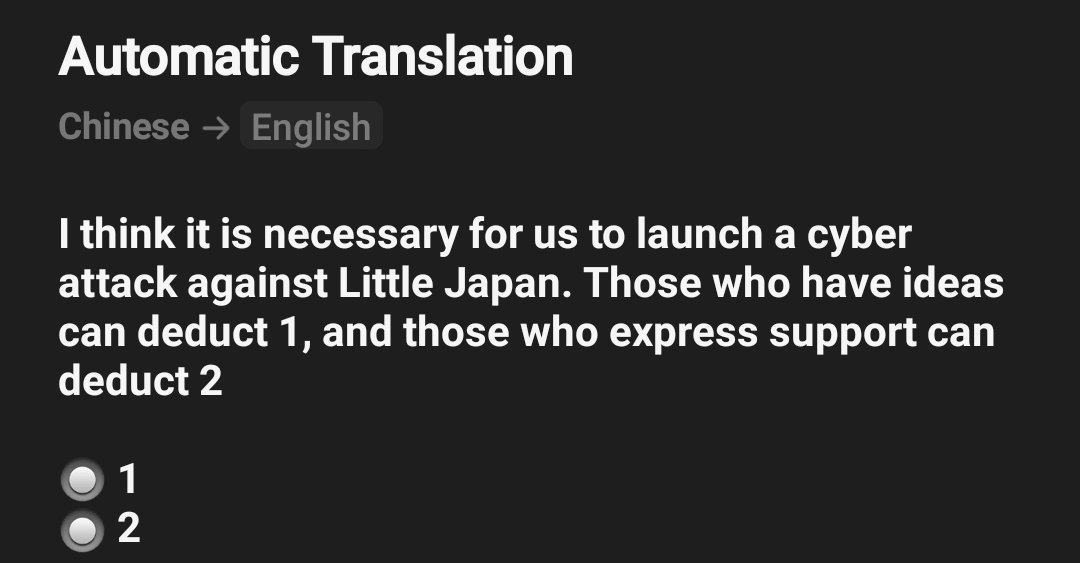Vulzsec, a hacktivist collective, has declared through their Telegram channel their intent to target Japanese infrastructure starting from August 28th.
This, the group claimed, was triggered by the decision of the Japanese government to release melted fuel debris from a nuclear power plant into the Pacific Ocean. OpJapan by Vulzsec has been initiated as a response to what the hacker collective perceives to be a “selfish nature” of the Japanese government.
OpJapan by Vulzsec
The hackers from the Vulzsec group wrote on telegram about their disapproval of the Japanese government and the United Nations.

“Possession of selfish nature shown by the Japanese government and the United Nations in this case without any coordination with other countries,” read the Telegram message.

“With this waste, no one can give responsibility even though they have provided compensation of approximately $200,000,000 USD but this does not guarantee replacing the resource,” the threat about OpJapan by Vulzsec further added.
The hackers have planned to launch cyber attacks on Japanese organizations from 28 August to 5 September 2023.
Japanese Government on the Nuclear Plant Waste
The Fukushima Daiichi nuclear power plant, situated in Okuma and Futaba towns in Fukushima, Japan, was conceptualized and constructed after the cessation of the final mining operation. The Tokyo Electric Power Company (TEPCO) was responsible for establishing both the Fukushima Daiichi and Fukushima Daini nuclear power plants.
However, the Fukushima Daiichi nuclear power plant was hit by the Great Japan Earthquake and tsunami in March 2011. This caused radioactive contamination causing local residents to be forced out of the region further halting agriculture and fishing in the region.
Through the following years, Japan continued to work on curbing the impact of the disasters.
On April 4, 2011, the nuclear plant operators had to release over 10,000 tons of radioactive water into the sea. This was to create more storage space to carry highly contaminated water.
According to a 2012 government-appointed independent investigation, it was found that the nuclear accident was caused due to the lack of safety management by the plant operators.
Several Fukushima Daiichi reactors were decommissioned, and underground walls were introduced to control the groundwater seeping, yet the problem continued due to future earthquakes, including the 2021 incident.
In 2021, the government announced its plans to release the radioactive water into the Pacific Ocean in about two years which was carried out on August 24, 2023.
This has sparked outrage among locals and now hacktivists because of the impact on the livelihood of the agriculture and fishing community among others.
China, on the other hand, has put a ban on importing seafood from Japan in the wake of the nuclear waste release into the Pacific Ocean.
Hackers Discuss OpJapan on Twitter/X

Several hacker groups were found discussing and claiming cyber attacks on Japanese organizations in the wake of the nuclear plant release in the ocean.
The screenshot shared above by the Threat Intelligence firm Cyber Know showed a translated message originally in Chinese language taken from a threat actor’s Telegram channel. It discussed the probability of the hacker group wanting to launch a cyber attack on Japanese websites.
Anonymous Italia Team, and Anonymous have posted tweets with screenshots of allegedly attacked websites of Japanese organizations.
OpTEPCO and OpFukushima were also announced by the hacktivist groups besides OpJapan by Vulzsec.
Anonymous Italy also sent a threat to the Japanese government claiming a cyber attack on the Japanese government website and others associated with the Fukushima facility.
The message talked about the effect of nuclear waste dumping on the environment and people. “21 Japanese government websites were taken offline by Anonymous Italy, alongside other websites directly affiliated with the Fukushima facility,” the tweeted video by hackers said.
Media Disclaimer: This report is based on internal and external research obtained through various means. The information provided is for reference purposes only, and users bear full responsibility for their reliance on it. The Cyber Express assumes no liability for the accuracy or consequences of using this information.

